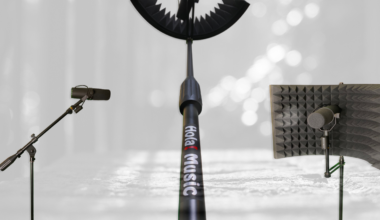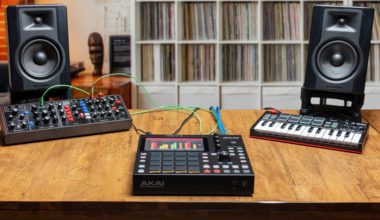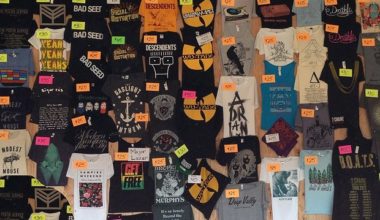
Welcome, fellow beatmakers, sound shapers, and melody makers! Today, we’re diving headfirst into the cacophonous symphony that is the world of music production. More specifically, we’re tuning our ears to the discordant notes in our compositions, the off-beat drum hits in our loops, and the out-of-tune vocals in our tracks. Yes, you guessed it – we’re talking about the “mistakes music producers make”.
Now, don’t get us wrong. We’re not here to point fingers or laugh at anyone’s missteps. After all, who among us hasn’t accidentally recorded over a perfect take or spent hours tweaking a mix only to realize our monitors were turned off? (Just us? Okay, moving on…)
The point is, mistakes are a part of the music production process. They’re the sour notes that make us appreciate the sweet ones. They’re the stumbling blocks that turn into stepping stones. They’re the… well, you get the idea.
In this guide, we’ll be exploring 15 common mistakes that every music producer makes at some point in their journey. But more importantly, we’ll be sharing tips and tricks on how to avoid these pitfalls and keep your production process running smoother than a well-oiled drum machine.
So, whether you’re a newbie beatmaker just starting out, or a seasoned pro who’s been around the block a few times, this guide is for you. Because let’s face it – no matter how good we get, there’s always room for improvement. And sometimes, the best way to improve is to learn from our mistakes.
So, without further ado, let’s dive into the fascinating world of “mistakes music producers make”. Cue the drum roll, please…
1. Not Knowing Your DAW Inside Out: The Musical Maze
Your Digital Audio Workstation (DAW) is like the cockpit of a spaceship. It’s where all the magic happens. But if you don’t know your DAW inside out, you’re like an astronaut who doesn’t know how to fly. You might be able to get off the ground, but good luck navigating the cosmos.
Knowing your DAW inside out is more than just knowing where the play button is. It’s about understanding the ins and outs of your software, from the intricacies of the mix console to the depths of the plugin library. It’s about knowing how to navigate the labyrinth of menus, buttons, and sliders like a seasoned explorer.
Learning the shortcuts for your DAW is like learning the secret passageways in a maze. It allows you to navigate faster, work more efficiently, and spend more time on what really matters – making music.
So, how do you get to know your DAW inside out? Start by reading the manual. Yes, we know, it’s about as exciting as watching paint dry. But trust us, it’s worth it. You’ll discover features you didn’t even know existed and learn new ways to streamline your workflow.
Next, practice, practice, practice. The more you use your DAW, the more familiar you’ll become with its features and quirks. Before you know it, you’ll be navigating your software like a pro, leaving more time for the fun stuff – creating killer beats.
Remember, a master craftsman knows their tools inside out. And as a music producer, your DAW is one of the most important tools in your arsenal. So, take the time to learn it, master it, and make it your own.
2. Spending Too Much on Gear: The Gear Acquisition Syndrome
Ah, gear. It’s shiny. It’s expensive. And it’s often completely unnecessary. Welcome to the world of Gear Acquisition Syndrome (GAS), a condition that affects many music producers. Symptoms include an insatiable desire for new gear, a belief that more expensive equipment will make your music better, and a wallet that’s constantly crying out in pain.
Here’s the thing: great music isn’t made by gear, it’s made by people. The Beatles didn’t need a state-of-the-art studio to record their hits. They just needed a good song and the skills to bring it to life. The same goes for you.
Instead of splurging on the latest gear, focus on honing your skills. Learn how to get the most out of the equipment you already have. A skilled producer can make a hit track with a basic setup, while an amateur with the best gear in the world will still sound like an amateur.
That’s not to say gear isn’t important. A good audio interface, a reliable pair of monitors, and a decent microphone can go a long way. But before you break the bank on a new piece of equipment, ask yourself: do I really need this, or do I just want it?
Remember, the most important piece of gear you have is your brain. Invest in knowledge, practice your craft, and the quality of your music will improve more than any piece of gear could ever achieve.
3. Not Finishing Tracks: The Art of Completion
Starting a new track is exciting. It’s a blank canvas, full of possibilities. But finishing a track? That’s where the real challenge lies. Many producers have hard drives full of half-finished tracks that they’ve abandoned in favor of starting something new. This habit of not finishing tracks is one of the common mistakes music producers make.
Think of it like building a house. Laying the foundation is exciting. You can imagine all the possibilities for your new home. But if you never actually build the house, all you have is a pile of bricks. The same goes for music production. If you don’t finish your tracks, all you have are ideas.
Finishing tracks is important for several reasons. First, it gives you a sense of accomplishment, which can boost your confidence and motivation. Second, it allows you to share your music with others, which can lead to opportunities and feedback. And third, it helps you develop your skills and refine your sound.
Here are a few tips for finishing your tracks:
- Set deadlines: Give yourself a deadline for each track you start. This can help you stay focused and motivated to finish.
- Break it down: If you’re feeling overwhelmed, break the process down into smaller tasks. Focus on one section at a time, or one element of the mix.
- Know when to let go: Not every track has to be perfect. Sometimes, it’s better to finish a track that’s good enough than to spend forever trying to make it perfect.
Remember, finishing tracks is an essential part of the music production process. It’s where ideas become reality, where skills are honed, and where music is born. So, make it a priority to finish what you start.
4. Not Collaborating with Other Producers: The Power of Teamwork
Music production can be a lonely business. But it doesn’t have to be. Collaborating with other producers can be a great way to learn new techniques, get feedback on your work, and make connections in the industry. Yet, many producers shy away from collaborations, making it one of the common mistakes music producers make.
Think of it like being in a band. You might be the best guitarist in the world, but without a drummer, bassist, and singer, you’re just a guy with a guitar. The same principle applies to music production. By collaborating with others, you can create something that’s greater than the sum of its parts.
Collaborating with other producers can also help you break out of your comfort zone and try new things. Maybe your collaborator introduces you to a new genre, or a new way of arranging your tracks, or a new plugin that revolutionizes your workflow. The possibilities are endless.
So, how do you start collaborating with other producers? Here are a few tips:
- Reach out to producers you admire: Send them a message on social media or an email expressing your interest in collaborating. Be sure to include a link to your music so they can get a sense of your style.
- Join online communities: There are countless forums, social media groups, and websites dedicated to music production where you can connect with other producers.
- Attend local events: Go to music production workshops, seminars, and meetups in your area. Not only will you learn new things, but you’ll also meet like-minded individuals who are interested in collaborating.
Remember, collaboration is a two-way street. It’s not just about what you can gain from the other person, but also about what you can contribute. So, approach every collaboration with an open mind, a willingness to learn, and a desire to create something awesome.
5. Not Using Automation: The Magic Wand in Your DAW
Automation in your DAW is like a magic wand. It can make your tracks come alive, adding movement and interest to your mixes. If you’re not using automation, you’re missing out on one of the most powerful tools in your production toolkit.
Imagine your track is a robot. Without automation, it’s just standing there, lifeless. But with automation, you can make it dance, wave its arms, and do the robot! In other words, automation allows you to add dynamic changes to your tracks that can take them from static and boring to dynamic and exciting.
You can use automation to do things like gradually increase the volume of a track to create a build-up, add a sweeping filter effect to a synth line, or pan a sound from left to right to create a sense of movement. The possibilities are endless.
But here’s the thing: automation is a tool, not a crutch. It’s there to enhance your music, not to fix fundamental problems in your mix or arrangement. So, use it wisely.
Here are a few tips for using automation effectively:
- Start simple: You don’t need to automate every single parameter in your mix. Start with simple things like volume and pan, and then experiment with automating different effects and parameters.
- Be subtle: Automation is most effective when it’s not immediately noticeable. It should enhance the listening experience without drawing attention to itself.
- Experiment: The best way to learn about automation is to try it out for yourself. So, get in there and start drawing some automation curves!
Remember, automation is your friend. It’s there to help you bring your tracks to life and add that extra bit of magic to your mixes. So, don’t be afraid to use it!
6. Overmixing: The Salt in Your Musical Soup
Overmixing is a common pitfall for many music producers. It’s like adding too much salt to your soup. A little bit enhances the flavor, but too much can ruin the whole dish. The same goes for mixing. A little bit can enhance your track, but too much can ruin it.
When you’re mixing, it’s important to use your ears, not your eyes. It’s easy to get caught up in making your EQ curve look perfect or your compressor settings match what you read in a forum. But at the end of the day, what matters most is how your mix sounds.
Remember, if it sounds good, it is good. So, trust your ears and don’t be afraid to break the rules. Maybe that kick drum needs a little more low end than conventional wisdom suggests. Maybe that vocal sounds better without any compression. There’s no one-size-fits-all approach to mixing, so don’t be afraid to do what sounds best for your track.
Here are a few tips to avoid overmixing:
- Take regular breaks: Your ears can get fatigued after long periods of mixing, which can lead to poor decisions. So, take regular breaks to rest your ears and come back to your mix with a fresh perspective.
- Reference other tracks: Listen to professionally mixed tracks that you like and compare them to your mix. This can give you a benchmark for what a good mix should sound like.
- Trust your instincts: If something sounds good to you, trust your judgment. You’re the producer, after all!
Remember, mixing is an art, not a science. It’s about enhancing the emotion and impact of your music, not achieving technical perfection. So, trust your ears, keep it simple, and avoid the trap of overmixing.
7. Not Using Real Sounds: The Symphony of Life
In the digital age, it’s easy to rely solely on software instruments and samples. But incorporating real, recorded sounds into your tracks can add a unique, organic element that sets your music apart. This is why not using real sounds is one of the common mistakes music producers make.
Think of your track as a painting. Software instruments are like the basic colors on your palette. But real sounds are like the textures and details that bring the painting to life. They add depth, character, and a touch of unpredictability that can make your music more interesting and engaging.
So, how do you incorporate real sounds into your music? Here are a few tips:
- Field recording: Grab a portable recorder and start capturing the sounds of the world around you. The hum of a city street, the rustling of leaves in a forest, the sound of waves crashing on a beach – these can all be used to add texture and atmosphere to your tracks.
- Foley: This is the art of creating sound effects for film and TV, but it can also be used in music production. Try recording everyday objects in interesting ways – the clang of a pot, the squeak of a door, the crunch of footsteps on gravel. You might be surprised at the unique sounds you can create.
- Live instruments: Even if you’re not a virtuoso musician, try incorporating live instruments into your tracks. The strum of a guitar, the tap of a drum, the shake of a tambourine – these can add a human touch to your music that software instruments can’t replicate.
Remember, music is a reflection of life, and life is full of sounds. So, don’t limit yourself to the digital realm. Explore the sonic world around you and bring those sounds into your music.
8. Not Learning Music Theory: The Language of Music
Music theory is like the grammar of music. It’s the set of rules and conventions that govern how music works. And just like learning the grammar of a language, learning music theory can help you express your musical ideas more effectively and creatively.
Now, we know what you’re thinking. “Music theory is boring. It’s all about rules and restrictions. I just want to make beats!” And we get it. But here’s the thing: music theory isn’t about telling you what you can and can’t do. It’s about giving you the tools and vocabulary to understand and manipulate music.
Think of it like this: you can build a house without knowing anything about architecture. But if you understand the principles of architecture, you can build a house that’s more beautiful, more functional, and more unique.
The same goes for music. Understanding music theory can help you create more interesting chord progressions, craft catchy melodies, and develop unique musical ideas. It can also help you communicate more effectively with other musicians and producers.
Here are a few tips for learning music theory:
- Start with the basics: Learn about scales, chords, and key signatures. These are the building blocks of music theory.
- Apply what you learn: Try to apply the concepts you learn in your own music. This will help you understand them better and see their practical use.
- Keep it fun: Music theory can be dry, but it doesn’t have to be. Try to find fun and engaging ways to learn, like playing music theory games or writing songs that incorporate the concepts you’re learning.
Remember, music theory is a tool, not a rulebook. It’s there to help you understand and create music, not to limit your creativity. So, embrace it, learn from it, and use it to make your music even better.
9. Not Taking Care of Your Ears: The Golden Instruments
Your ears are your most important instruments. They’re the tools you use to craft your sound, to balance your mix, to bring your musical vision to life. But many producers neglect their ears, leading to fatigue, hearing loss, and a decline in the quality of their work.
Think of it like this: you wouldn’t use a dull knife to chop vegetables, would you? The same principle applies to your ears. If you don’t take care of them, they won’t be able to perform at their best.
Here are a few tips for taking care of your ears:
- Monitor at low volumes: Blasting your music might feel good, but it can damage your hearing and lead to ear fatigue. Try to monitor at low volumes most of the time, and only turn up the volume for short periods when necessary.
- Take regular breaks: Just like any part of your body, your ears need rest. Try to take a 10-minute break every hour to give your ears a chance to recover.
- Protect your ears: If you’re going to a loud concert or working in a noisy environment, wear earplugs. They can reduce the volume without distorting the sound.
Remember, your ears are your most valuable asset as a music producer. So, take care of them, and they’ll take care of you.
10. Not Backing Up Your Work: The Digital Disaster
In the digital age, losing your work to a computer crash or a hard drive failure is a nightmare scenario. Yet, many producers don’t take the necessary steps to back up their work, making it one of the common mistakes music producers make.
Think of it like this: you wouldn’t leave your house without locking the door, would you? The same principle applies to your music. If you don’t back it up, you’re leaving it vulnerable to loss.
Backing up your work is a simple process that can save you a lot of heartache in the long run. Here are a few tips:
- Use a cloud storage service: Services like Google Drive, Dropbox, and iCloud allow you to store your files in the cloud, so you can access them from any device. Plus, they automatically sync your files, so you don’t have to remember to back them up.
- Invest in an external hard drive: This is a more secure option, as it allows you to keep a physical copy of your work. Just remember to update it regularly.
- Save multiple versions: Every time you make a significant change to a track, save a new version. This way, if something goes wrong, you can go back to an earlier version.
Remember, your music is precious. It’s the product of your time, your effort, and your creativity. So, protect it by backing it up regularly.
11. Not Taking Breaks: The Power of Pause
In the world of music production, it’s easy to get lost in the flow. Hours can pass by like minutes, and before you know it, you’ve been hunched over your computer for an entire day. While this kind of intense focus can be productive, it’s also important to take breaks. Not doing so is a common mistake many music producers make.
Think of it like running a marathon. You wouldn’t sprint the whole way, would you? You’d pace yourself, take water breaks, and maybe even walk a bit. The same principle applies to music production. Taking regular breaks can help prevent burnout, reduce the risk of repetitive strain injuries, and even boost your creativity.
Here’s why: when you take a break, you give your brain a chance to rest and recharge. This can lead to fresh perspectives, new ideas, and a renewed sense of energy when you return to your work. Plus, stepping away from your computer can help prevent eye strain, back pain, and other physical ailments associated with prolonged sitting.
Here are a few tips for taking effective breaks:
- Follow the 20-20-20 rule: Every 20 minutes, take a 20-second break and look at something 20 feet away. This can help reduce eye strain.
- Move your body: Stand up, stretch, go for a walk, do some yoga – anything to get your body moving and blood flowing.
- Do something you enjoy: Read a book, play a game, listen to some music. Doing something fun can help refresh your mind and boost your mood.
Remember, taking breaks isn’t a sign of laziness or lack of dedication. It’s a crucial part of the creative process and a key to sustainable productivity. So, give yourself permission to pause, rest, and recharge. Your music – and your health – will thank you. More importantly, it will help you eliminate one of the most common mistakes music producers make.
12. Not Seeking Feedback: The Echo Chamber Effect
Creating music can be a deeply personal process, and it’s natural to feel protective of your work. But if you’re not seeking feedback from others, you’re missing out on valuable perspectives that can help you grow as a producer. This is why not seeking feedback is one of the common mistakes music producers make.
Think of it like this: if you’re in an echo chamber, you’re only hearing your own voice reflected back at you. But when you step outside of that chamber, you can hear a symphony of other voices, each with their own unique sound and melody. The same principle applies to music production. By seeking feedback, you expose yourself to a symphony of perspectives that can enrich your own musical voice.
Feedback can help you identify weaknesses in your tracks that you might have overlooked, spark new ideas, and push you to improve your skills. It can be a reality check, a source of encouragement, and a catalyst for growth.
Here are a few tips for seeking and using feedback effectively:
- Be open-minded: Not all feedback will be positive, and that’s okay. Constructive criticism is a valuable tool for growth. Try to see it as an opportunity to learn, not as a personal attack.
- Seek diverse opinions: Different people will have different perspectives. Try to get feedback from a variety of people – other producers, non-musician friends, family members, and even your fans.
- Use feedback as a guide, not a rule: At the end of the day, you’re the artist. You get to decide what feedback to take on board and what to disregard. Use feedback as a guide to help you improve, but don’t let it dictate your creative decisions.
Remember, feedback is a gift. It’s a window into how others perceive your music, and a tool you can use to refine your sound, improve your skills, and grow as a producer. So, don’t be afraid to seek it out and say goodbye to one of the most frequent mistakes music producers make.
13. Not Experimenting: The Spice of Musical Life
Music production is a field ripe with possibilities. And that can be the root cause to mistakes music producers make. With a DAW and a few plugins, you can create sounds that have never been heard before. But many producers get stuck in a rut, using the same techniques and sounds over and over again. This lack of experimentation is one of the common mistakes music producers make.
Think of it like cooking. If you only use salt and pepper, your dishes might be decent, but they’ll never be truly exciting. But if you start experimenting with different spices, you can create dishes that are unique, flavorful, and memorable. The same principle applies to music production.
Experimentation can lead to innovation. It can help you develop your unique sound, keep your music fresh, and set you apart from other producers. Plus, it’s fun! There’s nothing quite like the thrill of trying something new and hearing a sound you’ve never heard before.
Here are a few tips for experimenting in your music:
- Try new plugins: There are thousands of plugins out there, each with its own unique sound and capabilities. Try a new one every now and then to expand your sonic palette.
- Experiment with sound design: Try creating your own sounds from scratch. You might be surprised at what you can come up with.
- Break the rules: Music theory and production conventions are useful guides, but they’re not laws. Don’t be afraid to break the rules and try something unconventional.
Remember, experimentation is the spice of musical life. It’s what keeps your music exciting, fresh, and uniquely you. So, don’t be afraid to step out of your comfort zone and try something new. Step away from one if the common mistakes music producers make.
14. Not Using Reference Tracks: The Musical Compass
In the journey of music production, reference tracks are your compass. They guide you towards your desired sound, help you make informed decisions, and prevent you from getting lost in the sea of possibilities. Yet, many producers overlook this valuable tool, making it one of the common mistakes music producers make.
Think of it like this: if you’re painting a landscape, you’d likely have a picture or a real landscape in front of you to guide your brush strokes. The same principle applies to music production. A reference track is like a picture of the sound you’re aiming to achieve.
Using reference tracks can help you make objective decisions about your mix, understand the standards of your genre, and learn from successful productions. It’s like having a mentor right there in your DAW, guiding you towards your best work.
Here are a few tips for using reference tracks effectively:
- Choose wisely: Pick a track that’s similar to the one you’re working on in terms of genre, arrangement, and production style. It should be a track that you admire and that has been well received by your target audience.
- Listen critically: Don’t just listen to the reference track passively. Analyze it. What makes it work? How is it structured? How are the elements balanced?
- Use it as a guide, not a template: Your goal isn’t to copy the reference track, but to learn from it. Use it as a guide to help you make informed decisions, but don’t let it stifle your creativity.
Remember, using reference tracks is a sign of professionalism, not a lack of originality. It’s a tool that can help you achieve your vision and produce your best work.
15. Not Having Fun: The Joy of Music Production
Music production is a creative, exciting, and rewarding process. But sometimes, in the pursuit of perfection, producers forget to have fun. This is one of the common mistakes music producers make.
Think of it like this: if you’re baking a cake, and you’re so focused on getting the recipe exactly right that you’re not enjoying the process, then what’s the point? The same goes for music production. If you’re not enjoying the process, then you’re missing out on one of the most rewarding aspects of being a music producer.
Having fun while you’re producing music is important for several reasons. First, it keeps you motivated. If you’re enjoying what you’re doing, you’re more likely to stick with it and see it through to the end. Second, it fuels your creativity. When you’re having fun, you’re more likely to take risks, experiment, and come up with unique ideas. And third, it’s good for your mental health. Music production should be a source of joy, not stress.
Here are a few tips for having fun while producing music:
- Experiment: Try new techniques, play with new sounds, break the rules. The joy of discovery is one of the most fun aspects of music production.
- Collaborate: Working with other producers or musicians can be a fun way to learn new things and keep the creative juices flowing.
- Remember why you started: Whether it was the love of music, the thrill of creating something from scratch, or the dream of seeing people dance to your beats, reconnect with the passion that got you into music production in the first place.
Remember, music production is supposed to be fun. It’s a creative outlet, a form of self-expression, and a way to share your love of music with the world. So, don’t forget to enjoy the journey.
Conclusion: The Symphony of Success
And there you have it, the 15 common mistakes music producers make. But remember, making mistakes is part of the journey. It’s how we learn, grow, and ultimately, create better music. So, don’t be too hard on yourself if you’ve made some (or all) of these mistakes. The key is to recognize them, learn from them, and use that knowledge to improve.
Think of your music production journey as a symphony. Each mistake is a note. On its own, it might sound discordant. But when combined with the right notes, it can create a beautiful melody. The melody of progress. The melody of growth. The melody of success.
So, keep experimenting. Keep learning. Keep having fun. And most importantly, keep making music. Because at the end of the day, that’s what it’s all about. Creating something from nothing. Expressing yourself through sound. Sharing your unique musical voice with the world.
And who knows? Maybe one day, your symphony will inspire others to start their own. And the cycle of creativity, learning, and growth will continue. Because that’s the beauty of music. It’s a universal language that connects us all, transcending barriers and bringing people together.
So, go forth and create. Make mistakes, make music, and make your mark on the world. We can’t wait to hear what you come up with.





